- Home
- Vicki Delany
Deadly Summer Nights Page 2
Deadly Summer Nights Read online
Page 2
The one thing Olivia hadn’t lost was her address book and the respect of her peers. With her influence, we were able to attract top-notch entertainment to our stage. That, plus Olivia’s own name and fame, kept guests coming. I’ve been told some people book their vacation at Haggerman’s rather than one of the better-known resorts in the hope of meeting Olivia Peters herself.
“I dance, my darling,” Olivia had said to me when she invited me to join her in this endeavor. “I leave the trivialities to other people.” She might as well have said “to the little people.” That meant me.
This is our second year here, and so far the concept seems to be working. It’s late June, the start of the season, and bookings are looking good for most of the summer.
The phone on my desk rang, and I glanced up from the payroll balance sheet I was trying to whip into some sort of shape. I threw down my pencil and leaned back in my chair, circling my shoulders and rubbing at the back of my neck in an attempt to work some of the kinks out. I could use some healthful exercise myself right about now, but these books weren’t going to balance themselves, and no one else would do it. I sighed and wiped sweat off my forehead. A dusty fan propped in a corner on top of an out-of-date New York State map book accomplished nothing but stirring the sticky heat around.
I answered the phone. “Hello?”
Darlene at the reception desk. “The Carletons in four-oh-five are threatening to check out and demanding a full refund. Mrs. Carleton says she saw a rat on their windowsill. If she wants to see rats, she’ll go back to the city.”
“Mrs. Carleton wouldn’t know a rat from a squirrel. Isn’t Mr. Carleton the one who threatened to sue us last week because he tripped over a branch while taking a shortcut through the woods?”
“Yup.”
“Yet here they still are. In the Catskills, where it’s been known to have an occasional tree branch fall onto the forest floor or a fluffy-tailed creature searching for sustenance. Okay, I’ll get Olivia to drop into their room and make soothing noises. That’s all they want anyway.”
Darlene chuckled. “Thanks, Elizabeth.”
We hung up, and I gave my shoulders another stretch. I glanced around the dark, tiny room that passes for my office. Guests never come in here, so no money had been spent on fixing it up. The green-and-brown wallpaper was yellowing and peeling in places, and when it rained, water dripped down the southern wall. After the first incident had soaked the reservations book so that the ink ran enough to be almost unreadable, I learned where not to place important papers. The only advantage my office has is the stiff, creaky back door that opens directly onto an overgrown, no-longer-used service path heading into the woods. I can sneak out without anyone knowing.
A tray had been placed on top of a stack of advertising materials from other resorts, which I planned to look through one day, when I had the time, to see what our competition was up to. I vaguely remembered hearing a server coming in at one point, but I’d been on the phone yelling at a delinquent meat supplier at the time. It looked as though the waiter had brought soup and a sandwich for my lunch. The soup was beef and vegetable, now gone stone-cold with an unappetizing greasy skin forming on the top.
I glanced at my watch. Quarter to four. Yet another day without a lunch break. A stack of envelopes sat on the corner of my desk, along with checks needing to be signed and mailed. I grabbed the phone and asked the switchboard operator to put me through to the house. All I got was a busy signal. If Olivia was on the phone chatting with one of her retired show business friends, she could be on for hours. Right now, a walk would do me good.
I grabbed the sandwich as I passed. Tuna fish. I hate tuna fish. The kitchen knows I hate tuna fish. I left through the central business office, chomping on my sandwich, folder of checks tucked under my arm. Our guests must hate tuna fish, too, if this was the leftovers from today’s lunch offerings.
Heads were down, phones were ringing, and cigarette smoke filled the air. At least this room was moderately cool: the fan actually worked.
“I’m so sorry, but we have no availability that week,” the reservations clerk said as she lit another cigarette. I don’t think I’ve ever passed her desk when she hasn’t had one on the go. “We have space the following week, in one of our best rooms, if that would suit.”
All of our rooms are “one of our best.”
“Yes, Mrs. Johnstone,” another woman was saying. “You need to reserve a table for the evening entertainment. It’s very popular, and guests come from resorts all over this part of New York. We do have a few good seats available for this evening. Shall I put you down for two?”
The business office opens onto a dark hallway. To my left there were more offices and the kitchens, and a few steps to my right, a door tucked unobtrusively under the wide, sweeping staircase that led directly into the lobby.
It was a Wednesday afternoon, so not many guests were arriving, and no one was checking out. The receptionist was leaning against a wall, studying her nails. She leapt to attention when she saw me, as well she should. I gave her a glare of disapproval and hoped that would frighten her into sharpening up. It was her first summer with us, and early in the season. She wouldn’t yet know that my glare is far worse than my actions. I’ll do just about anything to avoid firing someone. I leave that up to the department heads, coward that I am. The only time I’ve personally fired anyone was when a cocky young waiter from Westchester came to work so drunk he threw up down the front of the Christian Dior day dress worn by one of the lakefront-cabin guests as the lady was enjoying her breakfast.
Fans were swirling slowly in the lobby, and a wave of sticky heat hit me as the bellboy—handsome in his red-and-blue jacket with big gold buttons, and on the breast pocket the Haggerman’s logo of two pine trees forming an H silhouetted against an orange sun rising over the lake—leapt to attention to hold the door open for me.
Heat was good. Anything that had the residents of New York City fleeing their sweltering apartments for the forested hills and cool blue lakes of the Catskills was good.
The main building is surrounded on two sides by a spacious veranda of wide golden wooden planks, white railings and pillars, and flower boxes overflowing with geraniums and cascading ivy. A row of slatted-wood rocking chairs lines the walls, and much of the space is dotted with small tables and chairs where guests can relax and enjoy the view, have a drink, or meet with their friends. The regular four o’clock duplicate bridge tournament was getting started.
I skipped down the steps and headed for the lakefront path. Laughing, splashing children filled the pool while not-very-watchful mothers in giant sun hats relaxed on lounge chairs, smoking and reading or gossiping while sipping iced tea or cocktails. Velvet stood on the beach, watching Randy give swimming lessons to a group of women. These women were mostly elderly and having a great time, laughing and splashing with as much enthusiasm as the children in the pool, their brightly colored swim caps bobbing above the surface of the water. Farther out in the lake, teenagers dived off the floating platform into the cool water, orange paddleboats skimmed across the surface of the lake, and a rowboat took guests out to try to catch some fish. A game was ending on the handball court, and a doubles tennis match was underway on that court while two elderly men watched with half their attention and argued politics with the other half. Several of the cabins lining the lake had beach towels and wet bathing suits draped over porch railings to dry in the sun.
The well-maintained public path curves along the western shore of Delayed Lake, ending at the line of trees protecting guests from views of the boathouse, service dock, and equipment and maintenance sheds. From there, I turned into the narrower, overgrown walkway that heads uphill, skirting the woods, toward some of the staff dormitories and more equipment sheds. Olivia and I live in a small house at the rear of the property, set well back from the lake in a patch of thick woods. It’s quiet and secluded, and even at th
e busiest times I can sit on the front porch during the evening with the hope of not being disturbed. Unfortunately, it’s necessary to have a telephone in the house, and I am often disturbed by one crisis or another.
As I turned up our small private path I heard a rustle in the undergrowth. Far too large to be a rabbit or a squirrel. “Hello?” I said.
A man popped out from behind a pine tree. He was in his sixties, small and thin, a couple of strands of greasy hair plastered to his scalp with copious amounts of hair oil. He held his hat in one hand and a cane in the other, and his eyes darted nervously about. A Brownie camera hung around his neck. He gave me a weak smile. “So sorry. I hope I didn’t frighten you.”
I didn’t recognize him, but that didn’t mean anything. I work largely behind the scenes, and so many people come and go at Haggerman’s I can’t be expected to remember them all. “Can I help you with something, sir?”
“No. No. Nothing at all. Just out for a stroll. Lovely day.” He didn’t look at me. His eyes kept flicking toward the front porch of my house. There was something almost feral about him, and the hairs on the back of my neck started to rise.
“This area is off-limits to guests. Didn’t you see the signs?”
“Signs? No. I didn’t see any signs. So sorry. I’ll be off now.” He threw one last glance at the house before scurrying away.
I watched him go, gave my head a shake, and climbed the steps.
“Only me,” I called as I came in through the screen door.
My mother was stretched out on the sofa, feet up, drink at hand, flipping through Life magazine. She gave me a warm smile.
I nodded to the black telephone on the piecrust table near the kitchen. “I tried to call, but the phone was busy.”
“I’ve been on the line with darling Geraldine. Poor dear. She’s not doing very well.”
I didn’t know anyone named Geraldine, but that didn’t matter. I didn’t know most of the people my mother talked about.
A squat, round English bulldog waddled out of the kitchen to greet me, spreading drool everywhere he went. I bent over and gave him a scratch between the little brown ears on his brown-and-white head.
“Why’s Winston here?” I asked.
“I have absolutely no idea,” Olivia said. “Why is Winston anywhere? I went out for a walk after lunch, and when I got home I found him on the porch waiting for me.”
“I don’t like the idea of him running freely around the property. Not all people are dog lovers.”
“He’s harmless,” my mother said.
I suppressed a sigh. We’d discussed this before, more than once. The bulldog isn’t supposed to have the run of the property, but his owner, Olivia’s sister, Tatiana, doesn’t believe dogs should be confined, so she lets him pretty much go where he wants, when he wants. She’d always wanted a dog, but a tiny apartment above a corner store in Brooklyn isn’t the best place to keep an exuberant animal. Not that exuberant is the word I’d ever use to describe the quiet, slow-moving Winston. I don’t quite know where Winston came from, but when Aunt Tatiana stepped off the train that first day, come to run the housekeeping department at her sister’s resort, the short, squat, crinkly-faced dog got off with her.
“As I was returning from my walk, I ran into a most interesting gentleman,” Olivia said. “He’s taken a cabin until the end of July. We had a nice chat on his porch.”
“How interesting?” I asked.
“Rest assured, he was not interesting enough to be husband-number-four material, dear. He’s here by himself, which is unusual, but he’s wanting privacy and peace. I’m happy to grant him that, and I left him to it.”
“Speaking of men . . . A man was outside just now,” I said. “Behaving rather strangely.”
My mother’s eyes narrowed. “What did he look like?”
“Small, weaselly, greasy. Early to midsixties, at a guess. Walks with a cane.”
“Not my new friend, who’s tall and distinguished-looking. The man you saw sounds like Louis.”
“Louis?”
“Louis Frandenhelm. Frandeheim? Something like that. He waylaid me—that’s the only word I can think of—when I was having my walk. Overly enthusiastic followers are, of course”—she patted her hair modestly—“one of the burdens of fame. Louis told me he’s with his sister and her family for two weeks, and it was his suggestion they come to Haggerman’s this year, specifically hoping to meet me. He then regaled me with a comprehensive list of all the Broadway shows and Hollywood movies I’ve been in. He has, according to him, seen every one. I was only able to escape his . . . outpouring of adoration by joining a group of ladies also out for a stroll.”
“I’ll tell security to keep an eye out. We can ask him to leave if he’s bothering you.”
She waved her hand in the air. “He’s harmless.”
“I wouldn’t be so sure.”
“After all these years, I have an instinct for the dangerous ones. Now what brings you here in the middle of the day, Elizabeth?”
I wasn’t as confident as my mother about the “dangerous ones.” I made a mental note to have a word with the security guards. “I’ve brought some checks for you to sign.” I put the folder on the dining room table. “And to tell you that you need to make nice with the Carletons.”
She swung her legs to the floor and stood in one smooth liquid movement. A flash of pain crossed her face. I pretended, as I always did, not to notice. Olivia pretended, as she always did, that it hadn’t happened.
Her figure is one a woman half her age would envy—come to think of it, I’m half her age and I envy it. She’s graced with the perfect dancer’s body: tall, lean, and trim, topped with a long neck, pointed chin, sculpted cheekbones. Her lips are plump and her eyes so dark they’re almost black. Her flawless pale skin’s beginning to show a few signs of age around the eyes and the corners of the mouth, and these days her thick black hair owes more to the skill of her hairdresser than to her (supposedly) aristocratic Russian ancestors.
I, on the other hand, do not take after my mother’s family but my father’s Irish peasant forebears. People sometimes tell me I’m cute: curly red hair, green eyes, masses of cursed freckles, of average height, with a tendency to put on weight if I’m not careful.
“Them again,” Olivia said, referring to the Carletons, not the checks. Although she might have been meaning the checks. “What a bother.”
“Them again. They came last year. That means they’re regulars, and they need to be soothed. A squirrel got onto their window ledge, and they say it was a rat.”
My mother snorted. “Stuff and nonsense. They’re from New York City. They should know a rat when they see one.”
“This year they brought another couple with them. All the more reason to keep them happy.”
“I’ll drop into the cocktail hour and sit at their table. The Carletons are always quick to attend anything at which drinks are being served.” She settled herself at the table, Winston curled up at her feet, and I opened the folder, uncapped my pen, and handed it to her. She let out a mighty sigh. “I find this business of paying bills so tedious.”
“Which,” I said, “is why I collect the bills, prepare all the accounts, write the checks, and all you have to do is sign them.”
“Why don’t you sign them?” she said, not for the first time.
“Because I don’t own Haggerman’s Catskills Resort, Olivia,” I replied, not for the first time. “You do.”
“If there’s a check in there with my name on it, add an extra zero while you’re at it.” The screen door squeaked, and Aunt Tatiana came in without bothering to knock. Winston stretched every muscle in his body and slowly rose to greet her. “I was wondering where you got to,” she said to the dog.
“You’ll have to wait for that check,” I said. “You’re not threatening to foreclose or take us to court.” A
bit of an exaggeration; we were on track to break even and perhaps make a small profit this summer. But I must never forget that on track is a nebulous term. The hotel business is a tough one, and seasonal resorts even harder to keep profitable. A couple of bad days over the summer and we’d be set back irreparably.
“There’s an idea.” Tatiana coughed and took a drag of her cigarette at the same time. Winston settled himself at her feet.
I flipped the pages, and Olivia scrawled her signature across the checks: a giant O followed by a wiggly line that was supposed to represent Petrovia. The O, not many people knew, stood for Olga, which is her name. Not Olivia, which is what she calls herself onstage and off. These days, far more off than on.
She didn’t bother to read what she was signing, and I let out a sigh. I’d tried to teach her to at least keep an eye on the business affairs, but she had no interest. My mother had been raised to believe a properly behaved woman controlled her household budget but otherwise left all financial matters to her husband.
Which—I could point out until the cows came home but why bother—is why she’s here, trying to make a go of a midsize Catskills resort and not living in an apartment overlooking Central Park and being feted by the Broadway and Hollywood elite.
At last she reached the bottom of the pile, recapped the pen, and handed it to me. “There. Are you happy?”
“Ecstatically so.” I closed the folder and scooped it up. “For this afternoon anyway. I want these to get into town first thing in the morning for the early mail.” I turned to my aunt. “Everything okay in housekeeping?”
“Why would it not be?” she said.
“Just checking.”
“If things were not okay, as you say, then I would tell you, lastachka.”

 Silent Night, Deadly Night
Silent Night, Deadly Night Coral Reef Views
Coral Reef Views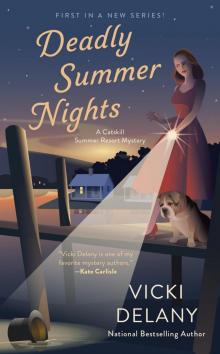 Deadly Summer Nights
Deadly Summer Nights Murder in a Teacup
Murder in a Teacup Whiteout
Whiteout Dying in a Winter Wonderland
Dying in a Winter Wonderland Tea & Treachery
Tea & Treachery Rest Ye Murdered Gentlemen
Rest Ye Murdered Gentlemen Body on Baker Street: A Sherlock Holmes Bookshop Mystery
Body on Baker Street: A Sherlock Holmes Bookshop Mystery Body on Baker Street
Body on Baker Street Gold Mountain
Gold Mountain Blue Water Hues
Blue Water Hues Hark the Herald Angels Slay
Hark the Herald Angels Slay Murder at Lost Dog Lake
Murder at Lost Dog Lake Blood and Belonging
Blood and Belonging A Winter Kill
A Winter Kill White Sand Blues
White Sand Blues Scare the Light Away
Scare the Light Away Burden of Memory
Burden of Memory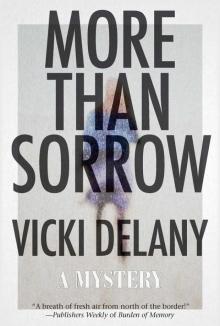 More Than Sorrow
More Than Sorrow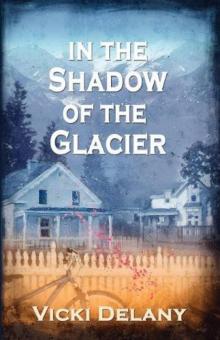 In the Shadow of the Glacier
In the Shadow of the Glacier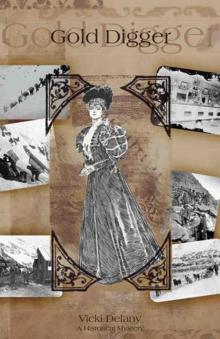 Gold Digger: A Klondike Mystery
Gold Digger: A Klondike Mystery Gold Web
Gold Web Haitian Graves
Haitian Graves Valley of the Lost
Valley of the Lost We Wish You a Murderous Christmas
We Wish You a Murderous Christmas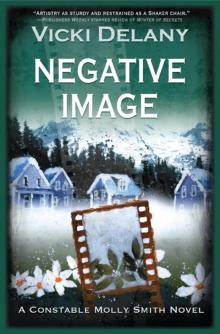 Negative Image
Negative Image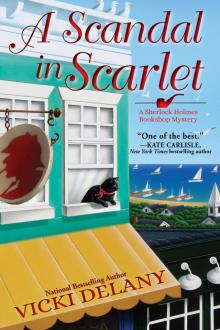 A Scandal in Scarlet
A Scandal in Scarlet Juba Good
Juba Good Winter of Secrets
Winter of Secrets Unreasonable Doubt
Unreasonable Doubt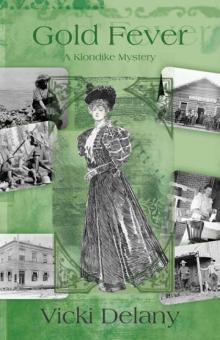 Gold Fever
Gold Fever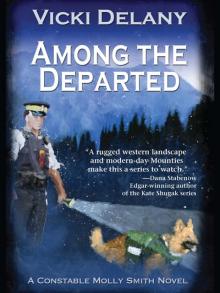 Among the Departed
Among the Departed Elementary, She Read: A Sherlock Holmes Bookshop Mystery
Elementary, She Read: A Sherlock Holmes Bookshop Mystery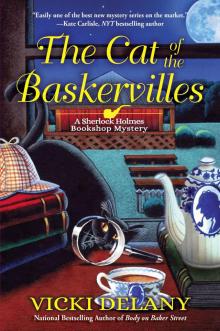 The Cat of the Baskervilles
The Cat of the Baskervilles